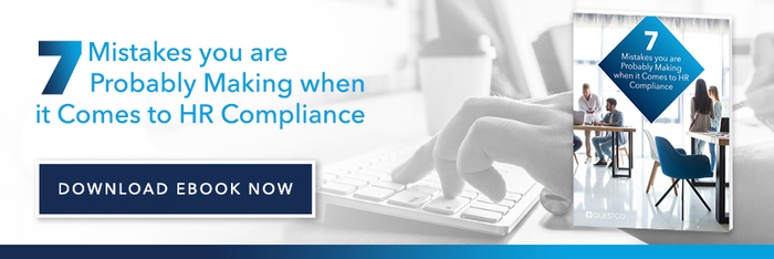Topic Payroll
8 Easy-to-Miss Payroll Errors that Prevent Growth
.jpg)
September 19, 2023 | By Questco Companies
.jpg)
What if the system designed to compensate your hard-working employees is the silent saboteur of your business growth?
While seemingly straightforward, payroll is riddled with potential pitfalls that can have far-reaching consequences. The gravity of the situation becomes apparent learn when considering that over 40% of small businesses are slapped with fines averaging $850 annually due to payroll tax missteps, as highlighted by Dutton Legal Group.
Such startling statistics emphasize the need to be vigilant about common payroll errors.
But what if there was a way to navigate this minefield effortlessly? That's where Professional Employer Organizations (PEOs) become vital. By outsourcing to a PEO, irritating payroll errors become a thing of the past, offering employers a solution and peace of mind.
But what are the most common payroll errors that can hamstring growth?
Error #1: Wasting Time and Money on Manual Payroll Processing
Relying heavily on manual payroll processing can be a significant setback when it means handling countless files, hard copies, and spreadsheets saved in various locations. With constant changes such as employee rotation, fluctuating pay rates, new contracts, and terminations, it's easy to see how things can go awry. The tedious task of entering, verifying, and managing payroll data isn't just time-consuming; it's a drain on resources.
Modern payroll software can streamline these processes, ensuring accuracy and efficiency. Time-tracking systems have become indispensable, offering real-time insights into employee hours, reducing the chances of miscalculations. Direct deposit, once a luxury, is now necessary, ensuring timely payments and reducing the risk of lost or delayed checks. Regular payroll schedules, when adhered to, keep everything on track, while accurate tax withholding prevents unpleasant surprises during tax season.

Error #2: Miscalculating Pay and Misclassifying Employees
Miscalculations in payroll aren't just about numbers; they're about trust. When employees can't rely on their employer to get their pay right, it shakes the foundation of the employer-employee relationship. And it's not just about underpayment or overpayment. It's about understanding the nuances of overtime rates, ensuring that employees are classified correctly as exempt or non-exempt, and setting clear salary bands.
Benefits eligibility is another area where errors can creep in. Misclassifying an employee can lead to them missing out on essential benefits, further eroding trust. And then there's the matter of tax brackets. Incorrectly categorizing an employee can lead to either paying too much tax or too little, which can have serious consequences.
Error #3: Wasting Time and Money on Fixing Payroll Errors
Few things are more a time suck than a payroll error that is discovered after it's already affected multiple employees. The resources spent on rectifying such mistakes can be staggering. It's not just about the immediate financial implications but the ripple effect these errors create.
Trust, once broken, can be challenging to rebuild. When payroll audits reveal discrepancies or pay stubs don't match employee expectations, the damage goes beyond the balance sheet. It seeps into the organization's very fabric, eroding employee trust and confidence.
And it doesn't stop there.
Compensation adjustments become necessary, and in some cases, disputes arise, further draining valuable time and resources. It's a scenario no employer wants to face, but it's more common than you might think.
Error #4: Low Flexibility of Your Payroll System
What happens when your payroll system can't keep up? Relying on outdated or inflexible systems can be a significant roadblock to growth.
Picture a sudden surge in hiring, but your payroll system can't integrate new employees efficiently. Or perhaps there's a need to introduce mobile payroll access for a remote workforce, but the system isn't equipped. These aren't just hypotheticals; they're real challenges businesses face.
Cloud-based payroll systems offer a solution, providing the scalability and customization essential for modern businesses. Yet, many organizations still grapple with legacy systems, missing out on the benefits of integration and the efficiencies of current solutions. It's a silent growth inhibitor lurking in the background, waiting to trip up unsuspecting businesses.
Error #5: Missing Payroll Deadlines
Every employer knows the importance of punctuality, especially when compensating their workforce.
But what happens when payroll deadlines are missed?
The consequences can be more severe than just a few disgruntled employees. Late payments can erode trust, leading to decreased employee morale and productivity.
And it's not just about the immediate team's dissatisfaction. Missing payroll deadlines can also attract penalties and potential legal issues.
Consider the chaos when employees don't receive their paychecks on time or when tax filing deadlines are overlooked. The ripple effect can be damaging, with year-end processing becoming a nightmare and payroll alerts and reminders going unnoticed. Such oversights not only strain the employer-employee relationship but also dent the company's reputation.
Error #6: Poor Payroll Records Management
One might assume that managing records is a breeze in the digital age. However, the intricacies of payroll make it a challenging task.
Incomplete or inaccurate payroll records can lead to miscalculations, compliance violations, and other issues.
For instance, if an employee's payroll profile is outdated, it will lead to incorrect deductions from their salary. Or consider the risks associated with missing payroll archives and the lack of proper data encryption and security. These aren't just minor hiccups but significant roadblocks that can hinder a company's growth. And it's not just about the numbers. Proper record retention policies ensure businesses comply with regulations, avoiding hefty fines and legal complications.
Error #7: Having a Poor Payroll Process
A poor payroll process isn't just about numbers going awry; it's about the ripple effect it creates throughout an organization.
Consider an employee that eagerly checks their bank account on payday, only to find a payroll fraud or an unrecorded work hour affecting their pay. This not only dampens morale but can also tarnish an organization's reputation.
Efficient payroll workflows are essential, not just for accuracy but for fostering trust. Regular payroll training and guidelines ensure everyone understands their roles and responsibilities.
By monitoring payroll benchmarks and KPIs, employers can gauge the effectiveness of their processes and make necessary adjustments. Feedback loops are invaluable, offering employees insights directly and highlighting improvement areas.
A streamlined payroll process isn't just about avoiding mistakes; it's about optimization, ensuring that every step adds value and propels the organization forward.

Error #8: Payroll Processes Slowing Down Your Growth
What happens when payroll processes become the anchor, weighing down potential growth? Manual tasks, like data entry, can be time-consuming, leading to delays that hinder expansion. And while payroll automation offers a solution, it's not just about replacing manual tasks with technology. It's about leveraging that technology to gain insights, make informed decisions, and drive strategic payroll planning.
Consider the impact of retroactive pay errors or the complications arising from benefit miscalculations. These aren't just numbers on a spreadsheet; they represent real-world challenges that can stifle growth. Employers need to be proactive, ensuring their payroll systems are efficient and scalable.
This means regularly evaluating the ROI of payroll processes and being ready to make upgrades when necessary. In a world where growth is paramount, there's no room for payroll processes that can't keep up.
Preventing Errors with a PEO
A PEO is a third-party outsourcing firm that provides comprehensive HR solutions for businesses. By partnering with a PEO, companies can offload many of their HR responsibilities, including the intricate details of payroll management. This ensures compliance and streamlines operations, allowing businesses to focus on what they do best.
With a PEO, payroll processes are seamless, errors are a thing of the past, and businesses can thrive without worrying about HR pitfalls.
With access to expert knowledge and up-to-date practices, the chances of making payroll mistakes diminish. In addition, PEOs offer enhanced flexibility and scalability, ensuring that as a business grows, its payroll systems can adapt without hiccups. And perhaps most importantly, with a PEO's assurance of compliance, the risk of legal troubles and penalties becomes a distant memory.
PEOs combine expertise with automated processes that drastically reduce manual errors. Their knowledge of employee classification and payment calculations ensures that issues like underpayment, overpayment, and misclassification are virtually eliminated. With a commitment to timely and accurate payroll processing, the days of late payments and missing paychecks are gone.
Comprehensive record-keeping and compliance checks mean payroll records are always up-to-date and in line with legal requirements. And with modern, flexible systems tailored to business needs, PEOs ensure that payroll is no longer a roadblock but a catalyst for growth.




